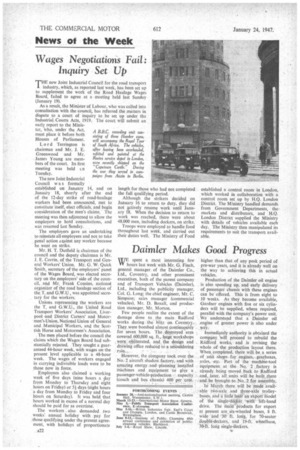News ot the Week
Page 24

If you've noticed an error in this article please click here to report it so we can fix it.
Wages Negotiations Fail:
Inquiry Set up THE new Joint Industrial Council for the road transport industry, which, as reported last week, has been set up to supplement the work of the Road Haulage Wages Board, failed to agree at a meeting held last Sunday (January 19).
As a result, the Minister of Labour, who was called into consultation with the council, has referred the matters in dispute to a court of inquiry to be set up under the Industrial Courts Acts, 1919. The court will submit an early report to the Minister, Who, under the Act, must place it before both Houses of Parliament.
Lord Terrington is chairman and Mr. J. E. Greenwood and Mr. James Young are members of the court. Its first meeting was held cn Tuesday.
The new Joint Industrial Council w a s formally established on January 14, and on January 18, shortly after the end of the 12-day strike of road-haulage workers had been announced, met to constituteltself, elect officials, and begin consideration of the men's claims. The meeting was then adjourned to allow the employers to hold consultations, and was resumed last Sunday.
The employers gave an undertaking to reinstate all employees and not to take penal action against any worker because he went on strike.
Mr. H. T. Duffield is chairman of the council and the deputy chairman is Mr. J. E. Corrin, of the Transport and General Workers' Union, Mr. G. W. Quick Smith, secretary of the employers' panel of the Wages Board, was elected secretary on the employers' side of the council. and Mr. Frank Cousins, national organizer of the road haulage section of the T. and G.W.0 , was appointed secretary for the workers.
Unions representing the workers are the T, and G.W.U., .the United Road Transport Workers' Association, Liverpool .and District Carters' and Motormen's-Union, National Union of General and .Municipal Workers, and the Scottish Horse and Motormen's Association.
The men placed before the council the claims which the Wages Board had substantially rejected. They sought a guaranteed 44-hour week, with wages on-the present level applicable to a 48-hour week. The wages of workers engaged in carrying indivisible loads were to be those now in force.
Employees also claimed a working week of five days (nine hours a 5:lay from Monday to Thursday and eight hours on Friday) or 54 days (eight hours a day from Monday to Friday and four hburs on Saturday). It was held that hours worked in excess of a normal day should be paid for as overtime.
The workers. also also demanded, two weeks annual holiday with pay for those qualifying under the present agreement, with holidays of proportionate length for those who had not completed the full qualifying period.
Although the strikers decided on January 16 to return to duty, they did not actively resume work until January 18. When the decision to return to work was reached, there were about 48,000 men, including dockers, on strike.
Troops were employed to handle food throughout last week, and carried out their duties well. The Ministry of Food established a control room in London, which worked in collaboration with a control room set up by H.Q. London District. The Ministry handled demands from Government Departments, the markets and distributors, and H.Q. London District supplied the Ministry with details of vehicles available each day. The Ministry then manipulated its requirements to suit the transport available.












































































